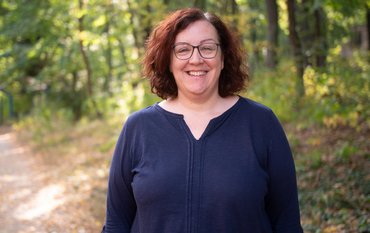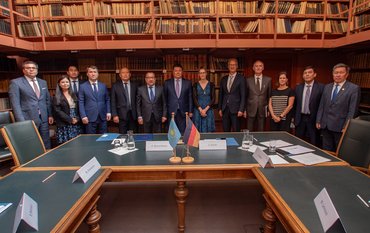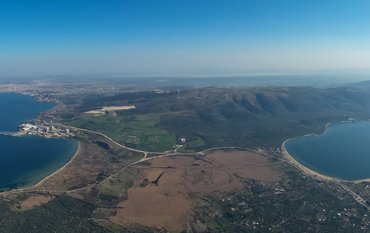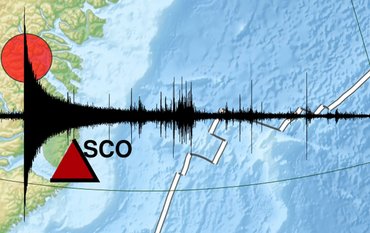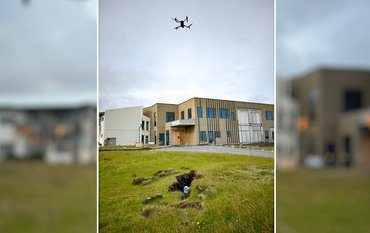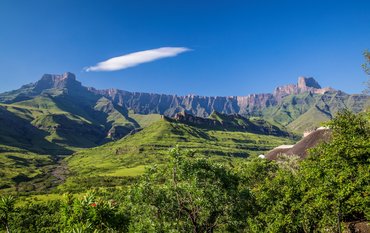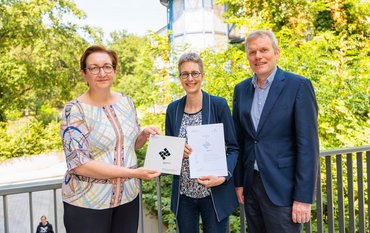At the German Geothermal Congress, two young female scientists who are both conducting research as part of GFZ projects in Section 4.8 Geoenergy were honoured: Leandra Weydt received the “Young Scientist 2023” award, while Lena Muhl was honoured for the best contribution to the “Science Bar”, where young researchers present their bachelor's, master's or doctoral thesis as a poster.
The German Geothermal Congress (DGK), to which the German Geothermal Association (BVG) invites the geothermal industry from Germany and abroad every year, took place in Essen from 17 October to 19 October 2023. It brings together science, business and politics to exchange knowledge and is unique in the German-speaking world. The German Research Centre for Geosciences has been an important partner of the congress for years and was represented this year with more than 20 specialist presentations and posters as well as an exhibition stand.
In 2024, the German Geothermal Congress will take place in Potsdam from 22 to 24 October.
Award for Leandra Weydt as “Young Scientist 2023”
Leandra Weydt received the award for her outstanding achievements in reservoir characterisation and investigating the potential of deep geothermal reservoir systems in recent years.
She has been working on her dissertation since 2017 as part of the EU project GEMex, coordinated by the GFZ, to analyse the potential of geothermal energy use in Mexico and was awarded her doctorate with “summa cum laude” at TU Darmstadt in 2022. In her doctoral thesis, she focused on the characterisation of super-hot (more than 350°C) geothermal reservoir systems in Mexico. She compiled a comprehensive rock database of two volcanic complexes with more than 32,000 data points. She also used drill cores to investigate hydrothermal alteration processes in detail, i.e. chemical and mineralogical changes caused by hot water in the rock and their effects on the reservoir properties. By linking various geological and geophysical data sets, she succeeded in improving reservoir characterisation. The application of her results in a 3D density model shows how important comprehensive analytical data sets are for reservoir characterisation and modelling.
In 2020, Leandra Weydt conducted research at Oregon State University (USA) with one of the coveted scholarships from the German Academic Exchange Service. As part of the EDGE project (an international research network for the optimisation of geothermal wells using deep machine learning and cloud-based data aggregation), she analysed drilling data from high-enthalpy reservoir systems in the USA and Iceland. Since 2022, she has been leading various research projects on 3D modelling of the Upper Rhine Graben and rock characterisation of the crystalline basement in Germany.
In his laudatory speech, Ernst Huenges, spokesman for the BVG's Honours Committee and former head of the Geoenergy Section at the GFZ, paid tribute to Leandra Weydt's work: “Her scientific achievements to date will make a significant contribution to the future exploration and development of deep geothermal systems.”
Congratulations from Section Head Ingo Sass
“Leandra Weydt has achieved strong results in her dissertation in the major European project GEMex and processed them in such a way that they can be taken into account in application. This is particularly impressive as she dealt with a topic from basic research. She has also combined her scientific work with intensive publication activities. In a follow-up project in Mexico, the GFZ has been asked to provide geoscientific support for an industrial project. Leandra Weydt made a decisive contribution to this.”
About the person
Leandra Weydt graduated from TU Darmstadt in 2016 with a Master's degree in Applied Geosciences, specialising in engineering geology and geothermal energy. Before starting her PhD in 2017, she worked as an engineering geologist in the field of geotechnics. In 2020-2022, she was a visiting scientist at Oregon State University, USA, and received her doctorate with “summa cum laude” from TU Darmstadt in 2022. She has been heading a research group at TU Darmstadt since June 2022.
Scientific contact:
Dr Leandra Weydt
Institute for Applied Geosciences
Technical University of Darmstadt
Phone: +49 6151 16-22301
E-mail: weydt@geo.tu-darmstadt.de
Poster prize for Lena Muhl
Lena Muhl presented the first results of her doctoral thesis on her poster entitled “Improvement of permeability by chelating agents in granitoids (Odenwald and Black Forest, Germany)”. She is investigating the use of environmentally friendly chelating agents for the chemical stimulation of geothermal reservoirs. Stimulation is intended to help improve the permeability of the rock and create flow paths so that the warm water can be pumped out or through for utilisation.
One way of achieving this is through hydraulic stimulation. This involves forcing water into the subsurface at high pressure in order to mechanically break up the rock. This can lead to induced seismicity, i.e. vibrations in the subsurface.
In order to reduce the risk of such underground tremors, an environmentally friendly chemical stimulation of geothermal reservoirs with chelating agents has recently been proposed. This involves adding natural additives to the injected water, substances that, for example, bind certain elements and thus ensure that flow paths widen or that cracks in the rock, once created, do not become blocked again.
Lena Muhl has used these environmentally friendly chelating agents to investigate their potential for German rocks. On her poster she presented the results of flow-through experiments with these environmentally friendly chelating agents for a range of granitoids, typical rocks in regions of Germany that are suitable for geothermal utilisation. The experiments were carried out under the temperature and pressure conditions typical for geothermal applications.
The first results show a rapid and large improvement in permeability at 200°C under a confining pressure of 55 Mega Pascal. It was found that a frequently occurring mineral, biotite, which had previously been identified using X-ray CT measurements, was frequently dissolved. Thus, existing flow paths were extended. The results show that this type of stimulation can support hydraulic stimulation and could therefore reduce the risk of underground vibrations.
Congratulations from section head Ingo Sass
“I am delighted that Lena Muhl has successfully prevailed against 27 competitors. Thanks to her strong initiative, she has laid the foundations for the cooperation with Tohoku University in Japan and brought this exciting research topic to the GFZ. In her presentation, she impressively demonstrated how science from the laboratory can be communicated in a vivid way. Congratulations!”
About the person
Lena Muhl is currently a PhD student, both at the GFZ in Section 4.8 Geoenergy and at TU Darmstadt. She has completed research stays at Tohoku University in Sendai, Japan, and at UniLaSalle in Beauvais, France. She worked on the project “AMPEDEK - Atlas of Mineralogical and Petrophysical Properties of German Crystalline Host Rocks” and on the project “Hessen 3D 2.0: 3D model of the petrothermal and medium-depth potential for power generation, heat utilisation and storage in Hessen” at TU Darmstadt. She also completed her Master's degree in Applied Geosciences there, in collaboration with the GFZ Potsdam. Her thesis was entitled “Hydro-mechanical parameters of Cornubian and Odenwald reservoir granitoids with focus on fracture stiffness testing and modelling”.





![[Translate to English:] [Translate to English:] Abror Gafurov von dem Schriftzug "Welcome to Azerbaijan" und den UN und COP Logos](/fileadmin/_processed_/2/5/csm_2024_11_Baku_COP29_Abror_Gafurov_1042faec82.jpeg)



![[Translate to English:] Martin Herold standing in front of the library on the Telegrafenberg](/fileadmin/_processed_/c/d/csm_Martin_Herold_d385ee4dd9.jpeg)
![[Translate to English:] Many people are listening to a presentation in the GFZ lecture hall.](/fileadmin/_processed_/c/a/csm_1_Bild1_hell_b9c0e9f5ed.jpeg)





![[Translate to English:] Both scientists sitting on stools in front of a wall of books in the Telegrafenberg library](/fileadmin/_processed_/6/6/csm_Buiter_Castell_DORA_4_e87cb1ea18.jpeg)
![[Translate to English:] Gruppenbild mit 4 Personen](/fileadmin/_processed_/8/d/csm_20241017_GFZ-Emmerman-Medal-005_web_reinhardtundsommer_21a414fa4a.jpeg)






![[Translate to English:] Ice landscape with five red tents](/fileadmin/_processed_/8/9/csm_Zeltlager_auf_dem_Eis_Urheberin_Jenine_McCutcheon_5ced2d523b.jpeg)


